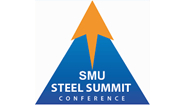Product

September 7, 2021
SMU Steel Summit: Carbon Border Tax in Steel’s Future?
Written by Tim Triplett
Phil Bell, president of the Steel Manufacturers Association, puts the chances of the U.S. steel industry facing a carbon tax at roughly 50-50, “though it is trending that way,” he said in remarks during Steel Market Update’s Steel Summit last month in Atlanta. “SMA is opposed to any taxes that aren’t necessary and is opposed specifically to a carbon tax unless it’s accompanied by a border adjustment mechanism,” he added.
Governments around the world are considering policy measures to reduce the harmful carbon dioxide emissions from steel and other industries that are contributing to global warming. Interest is growing in a system that would place a tax on carbon emissions; thus countries with lower environmental standards and higher emissions would have to pay a penalty when exporting to other countries.
A carbon tax alone would disadvantage American manufacturers, who are already the “greenest” in the world, Bell said. SMU would only support such as tax if it was accompanied by a border adjustment. “A carbon tax and border adjustment are symbiotic. You need both so that high-CO2-emitting foreign steel that comes to this country pays the same price that the domestic industry paid to lower their CO2 footprint,” Bell said. Also, without a carbon border adjustment system, steel production would just migrate to nations without a carbon tax to avoid the higher cost – an issue known as “carbon leakage.”
The U.S. steel industry produces about 70% of its steel by melting scrap in electric arc furnaces, versus about 30% EAF production in the rest of the world. Compared to the other nations that are still reliant on blast furnace steelmaking, the U.S. is anywhere from 75-320% less carbon intensive, depending on the product and country of origin. “Current climate policies and trade rules don’t take this into account enough to give our industry the credit it deserves for its low carbon output,” Bell said.
“How do we turn America’s carbon advantage into a competitive advantage?” he asked. Theoretically, a tax that accounts for carbon emissions would reduce or eliminate imports of dirty, unfairly traded steel by making it more expensive and thus increase the market share of domestic steelmakers, Bell said. However, foreign governments that are subsidizing their industries to help convert inefficient integrated mills to EAFs like those in the U.S. are giving competitors an unfair boost. “We are all about a cleaner environment, don’t get me wrong, but we are also about fairness and a level playing field,” Bell said, noting that U.S. steelmakers have invested “billions of their own money” to reduce their carbon footprint.
It’s understandable the U.S. steel industry would have mixed emotions about a carbon tax. If cutting emissions were a footrace, the American steel industry would be lapping the competition right now. But it’s in the best interests of the planet for the rest of the world to catch up.
By Tim Triplett, Tim@SteelMarketUpdate.com







